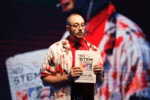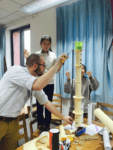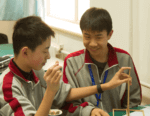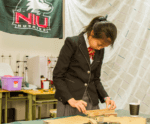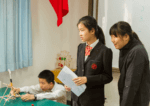For the past two years, NIU alum Sam Watt (BS Physics, 2014) has been teaching science in Beijing, introducing the seventh- and eighth-graders at Beijing Academy (北京中学)—as well as their teachers, parents and administrators—to an exciting hands-on approach to STEM education.
As a STEM educator for NIU’s Center for P-20 Engagement and member of the STEM Outreach team, Watt is dedicated to increasing science, technology, engineering and math (STEM) literacy and enthusiasm. When the opportunity arose to do this in China, he jumped at the chance to experience a new place and culture while teaching the science he loves.
Watt says his main goal—and most significant challenge—was to impart a philosophy of STEM as a process of trial and error where the journey of discovery and invention is just as important as the end result. Through hands-on activities—in contrast to the rote memorization that is more common in China—students gained a deeper understanding of core scientific principles and the scientific method. “In China, there tends to be an assumption that there is one right answer to every problem, and that how you get to that answer doesn’t matter. Students were afraid of being wrong and wanted to do the same thing their neighbors were doing. Instead, I wanted to teach that it was OK to fail and try again, and that there might be more than one right solution.”
Watt instilled this philosophy through a series of projects that allowed students to experience the processes of experimentation, engineering design, testing and analysis of data. The catapult launcher project was one of Watt’s and the student’s favorites.
For this project, students took about eight weeks to research catapults, do a series of experiments, and design their own ping-pong ball launchers. Watt divided the students into two groups of ten, with curtains between so they couldn’t see what the other team was doing. Meeting for about 90 minutes a week, the students were able to test and analyze experiments to see how different variables affected the range and accuracy of their launchers.
In addition to deepening their scientific understanding, students had a chance to develop teamwork and leadership. “I had each team choose a ‘general’ for their army,” says Watt. “These kids—Phoebe and Martin—were two of the most academic but were shy and quiet and did not have leadership experience. They were thrown into leadership, and they blossomed.” At the completion of the project, Watt says, “We lifted the curtain and they started shooting rice balls at targets—including pictures of their teachers.”
This fun approach to STEM paid off. “Over time,” Watt says, “there was less temptation to copy what their neighbors did.” Students learned to focus on substance rather than appearance and to pay attention to the deeper scientific principles at work. “They learned that I didn’t care what it looked like. How it acts is important, not how it looks.”
Watt also went through a learning process of his own after arriving in Beijing, not speaking Chinese and with limited cultural background. “On the first day, my flight landed at 4 a.m., and by 9 a.m. I was in the classroom, teaching with a translator.” His translator and the other people he met were friendly and welcoming. Watt says, “I arrived in September and by October I had been invited to a wedding. I would be literally pulled into a restaurant to have drinks with strangers.”
Watt also learned to adapt his teaching: “I didn’t care what the project looked like—just what it did—but I learned to take a little more time and make sure things were polished and it looked good because this was important in the culture.” Watt says, “I also learned to add an extra 90 minutes to every project plan because the students were very precise. They might cut tape to exactly 12 centimeters, for example, so things took longer.”
Although Watt has left Beijing Academy after two years there, the teachers plan to adapt his lesson plans to incorporate hands-on projects into their STEM classes. And Watt—along with other STEM Outreach colleagues—will return every few months to provide professional development workshops for teachers. Watt says, “I grew as a person and as a professional in Beijing, and I am so grateful for this experience.”
For more information, contact Sam Watt at swatt1@niu.edu.
